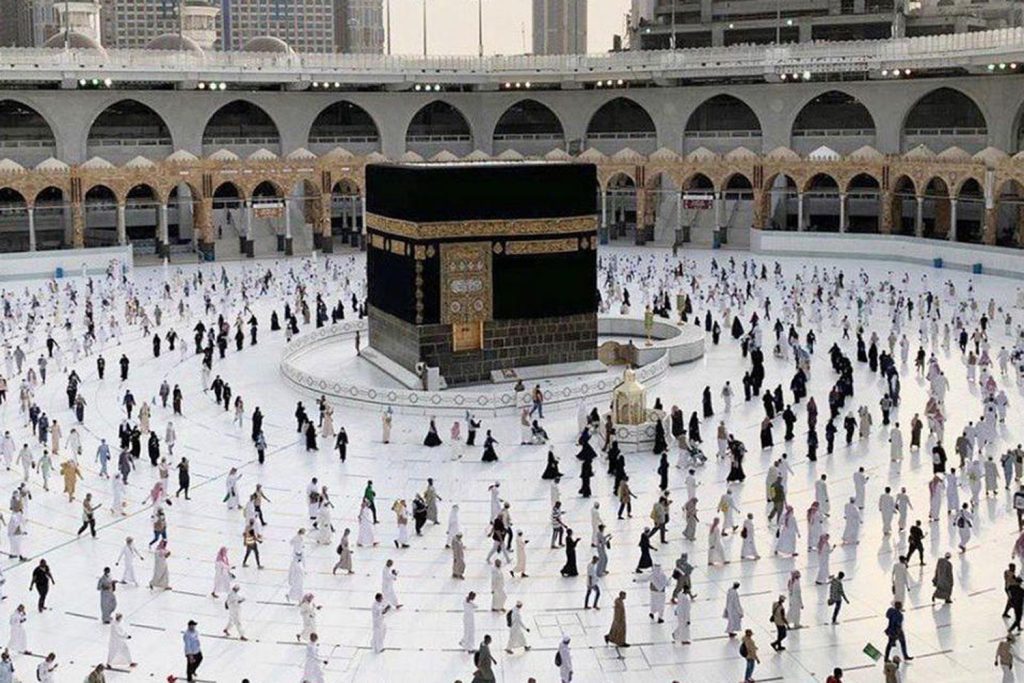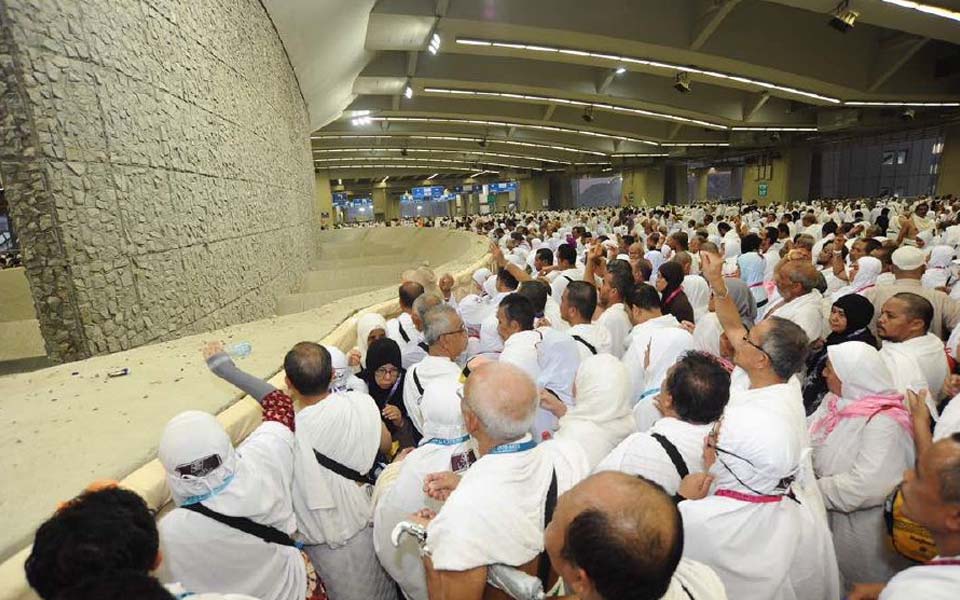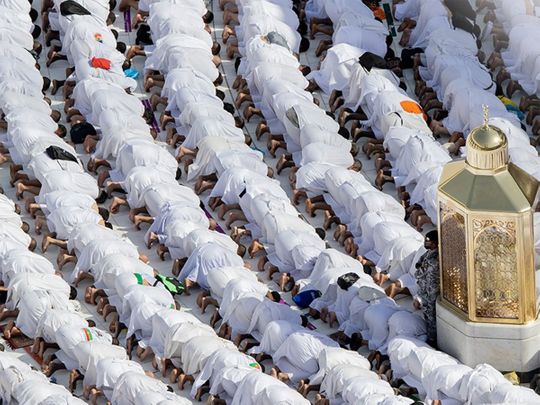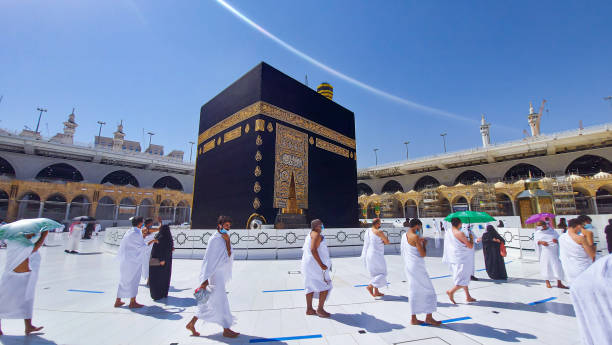When the pilgrim arrives at Mina, he stops making Talibiyyah when he reaches Jamratal – Aqabah. It is recommended that he carry out the required rites in the order that the prophet PBUH did. If, however, he does them in a different order, there is no harm in it, for whenever Allah’s Messenger (PBUH) was asked regarding a rite put forward or delayed, he would say
“Go on, No problem.”
These rights are as follows
Firstly: The pilgrim goes to Jamratal-Aqabah after sunrise. On arriving there, it is recommended that he stand with the Kabah to his left side and Mina on his right, if that is easily possible, for that is what the Messenger of Allah (PBUH) did. If that is not easily possible, he can stand any way he can. He stops reciting Talbiyyah and throws seven pebbles, successively raising his hand while throwing each pebble and saying ‘ Allahu Akbar’ with each one.

Prophet’s (PBUH) tradition, and some cautions on Etiquettes of Stone Throwing
- The pilgrim should ensure that the pebbles fall on the stone pillar or into its border, but it is not a condition that they should remain there. If a pebble falls on the stone pillar and then bounces out, what is required has been achieved.
- The pilgrim should not push his way through the crowd in a violent way lest he harms his brethren in faith, among whom are women, the weak, and the disabled. Some people throw harmful objects such as big rocks, shoes, and sticks; these are not recommended. Some even thrust forward like an enraged camel with no consideration for the situations of his fellow pilgrims, thereby hurting weaker people. Doing such contradicts humility and devotion that the act of worship necessitates. Some pilgrims go as far as uttering statements with no supporting evidence such as, “ O Allah! This is in anger with Satan, seeking the pleasure of the Most merciful lord”. The only recommended statement or supplication here is “Allah Akbar.”
- It should be noted that it is wrong and an act of ignorance to throw the pebbles two times or more in a day. The Muslim is only obliged to worship Allah in line with what is authentically recorded from His Messenger(PBUH) to attain Allah’s love and forgiveness
Allah says:
“Say ( O Muhammad (Peace be upon him ) to humankind): “ If you ( really ) love Allah then follow me (i.e., accept Islamic love you and forgive you your sins. And Allah is Oft-Forgiving Most Merciful.” (Al Imran 3:31)
- It is significantly erroneous on the part of someone who can throw the pebbles by himself to delegate others to do so on his behalf. This is an act of negligence and a significant error. Throwing the pebbles is part of the rites of Hajj, and Allah instructs:
“And perform properly (i.e., all the ceremonies according to the ways of Prophet Muhammad (peace be upon him) the Hajj and Umrah (i.e., the pilgrimage to Makkah) for Allah.” (Al-Baqarah2:196)
This verse implies that all aspects of Hajj must be done correctly by the pilgrim himself and that he should not delegate anyone to do them on his behalf. Therefore, the pilgrim should look for a suitable time for stoning. If he can do it during the day, it is better, but if he cannot delay the throwing till night.
- Some people say the entire body of a woman is her nakedness; therefore, she should not mingle with men in a crowded place to throw the pebbles. The fact, however, is that the entire body of a woman is not nakedness. What has considered nakedness is for a woman to expose her body, in the presence of alien men, what she should not expose. If we agreed that her entire body is nakedness, then we should say that she should never be allowed to go out of her house. This is against the injunctions of the Quran and the sunnah and contradicts the consensus of the Muslims. It is true that a woman is weak and can tempt men. If she is afraid of throwing pebbles along with throngs of men, she can delay her throwing till night. That is why the Messenger of Allah (PBUH) did not allow the weak members of his family, such as Sawdah, to abandon the throwing and delegate others to do it on their behalf despite their weakness.
- If a pilgrim is unable to throw the pebbles himself neither in the day nor in the night, we can then say that he is allowed to delegate others to do so on his behalf due to his inability. There are reports that the prophet’s companions would throw the pebbles on behalf of their children. If it were not for this report, we would say that if a person cannot throw the pebbles by himself, he is excused with an alternative such as making expiation or without. For inability to carry out an obligatory act makes a person exempted, and the one not obliged should not carry out an obligation an obliged person is unable to carry out due to his incapacitation.

- The proxy can throw pebbles at each of the three Jamarat on behalf of himself first and then on behalf of the person who delegated him on the same spot. He does not need to do the three throwing in a single run for himself first and then start all over again and do the same on behalf of the person who delegated him. This is inconvenient and very difficult.
Secondly: if the pilgrim is obliged to slaughter a sacrifice, he turns his sacrifice towards the direction of the qiblah and slaughters it. The sacrifice can be a goat or one-seventh of a camel or a cow. It is recommended that he says at the time of slaughtering the sacrifice
Bismillah, walllahuAkbar ,Allahummahadhaminkawalaka.
In the Name of Allah, Allah is the greatest Allah! This (sacrificial animal ) is from you and (is slaughtered) for you.
- It is desirable that the pilgrim eats from his sacrifice and gives some out as a gift and charity. The sacrifice should be purchased from lawful earnings, for Allah is pure and accepts that which is pure.
- The sacrificial animal should meet the conditions stipulated for the Udhiyah sacrifice. Therefore, adequate consideration should be made for the recognized age of the animal eligible for being sacrificed, which is six months for a ram, one year for a goat, two years for a cow, and five years for a camel. Equally, the animal should be free of all blemishes explained by the messenger of Allah; namely, it should not be explicitly one-eyed, clearly sick, lame, or emaciated. The time of slaughtering begins after sunrise on the day of sacrifice (Eid) and to sunset on the 13th day of dhulhijjah.
- Thirdly:After slaughtering the sacrificial animal, the pilgrim shaves his head or trims his hair. Shaving is more meritorious because the Messenger of Allah invoked Allah’s mercy and forgiveness three times for the shavers and once for the trimmers. Trimming mere parts of the head is not sufficient.Instead, it should be comprehensive and cover all parts of the head. The woman pilgrims only trim off the size of a fingertip of each lock of her hair. After throwing the pebbles of jamaatal – Aqaba and shaving or trimming, the pilgrim is permitted to do all that was forbidden in the state of ihram except for marital intercourse. Thisis called preliminary termination of ihram
- Fourthly: It is desirable for the pilgrim, after this preliminary termination, to use perfume and head for Makkah to perform Tawaaful – Ifadah and to observe two rakahs behind the station of Ibrahim if doing so is easily possible. If it is not easily possible, then they can be performed anywhere in the sacred Mosque. The pilgrim doing tamattu will have to make sa’yee between Safa and Marwah. This sa’yee is for Hajj, and the earlier one was for his umrah. The one dong qiran or ifrad only needs to make one say’ee if he had already made one after performing the arrival tawaf. He does not need to repeat it. It is better to do the above four rites in the order mentioned above. If a pilgrim does one of these four things before the other, all are still valid. After performing these four rites, everything that was previously forbidden while the pilgrim was in the state of ihram is now valid, including marital intercourse.

- The pilgrim should drink zamzam water while facing the qiblah until his thirst is completely quenched. He can sprinkle some of the water on his body and dress but should not bath with it.Itis recommended to say while drinking the water Allah bless us by drinking this water with helpful knowledge and expansive provision make it the quench of our thirst and healing for all ailments Allah! Cleanse my heart with it and fill my heart with your fear and wisdom from you; alternatively, one can make whatever useful supplication one finds easy for one attains the purpose for which he drinks zamzam water.

After Tawaful –Ifadah, and sa’yee for whom it is incumbent, the pilgrims return to mina to stay for the next two or three days and nights—throwing pebbles at the three stone pillars every day after the sun has passed the zenith As for the pilgrim who wants to hasten his departure from mina. He only stays for two days and nights (i.e., 11th and 12th).
